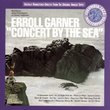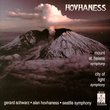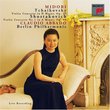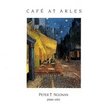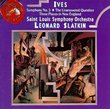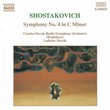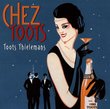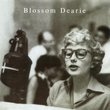| All Artists: Stravinsky, Salonen, Stockholm Chamber Title: Apollon Musagete / Cantata Members Wishing: 0 Total Copies: 0 Label: Sony Original Release Date: 1/1/1991 Re-Release Date: 9/6/1991 Genre: Classical Styles: Opera & Classical Vocal, Ballets & Dances, Ballets, Chamber Music, Forms & Genres, Concertos, Historical Periods, Modern, 20th, & 21st Century Number of Discs: 1 SwapaCD Credits: 1 UPC: 074644666724 |
Search - Stravinsky, Salonen, Stockholm Chamber :: Apollon Musagete / Cantata
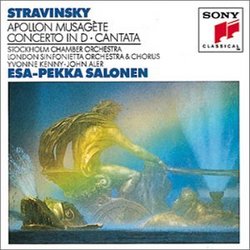 | Stravinsky, Salonen, Stockholm Chamber Apollon Musagete / Cantata Genre: Classical
|
Larger Image |
CD DetailsSimilarly Requested CDs
|
CD ReviewsIf I could only listen to one CD for the rest of my life.... 10/27/2001 (5 out of 5 stars) "I would have to seriously consider this one. I have spent four months attempting to track down the best overall performance of Apollo, and have come to the conclusion that this is it. The performance is spirited and the sound is immaculate. The only complaint that one could have is that the final cadence to the First Act is in half-time compared to other performances, and as all of the other recordings I have heard follow this guideline, I can only assume that Mr. Salonen doctored the score. However, this is a small price to pay for the privelege of hearing the finest piece of music a mortal can hope for. I once thought that all of music was a grand lie perpetrated on the masses by sick artists concerned solely with their own glorification: this piece reached out to me as I lay dying in the gutter of modern consumer culture and bid me to love music again. The surest cure for modernity and a call to a greater human destiny..." If you like Stravinsky, don't miss this CD ! Alejandra Vernon | Long Beach, California | 12/06/2000 (5 out of 5 stars) "...and if you don't, you might change your mind."Apollon Musagète" is a melodic, gorgeous piece for strings created for a ballet in 1927, choreographed by George Balanchine. It's themes weave and flow into each other, with some parts having marvelous rhythmic patterns."Concerto in D for String Orchestra", written in the mid 40's was used by Jerome Robbins for his ballet "The Cage" (about the mating habits of spiders !) in 1951. This incredible piece, though seldom heard unless performed as "The Cage" is fabulous. For the sensual "Arioso: Andantino" alone it's a must to have.The beauty of "Cantata" is in a different style. Composed in '51, it's much more "modern". Either because as a student of Balanchine I'm more familiar with the ballet compositions, or because of all languages for singing, English is my rock-bottom least favorite, this piece is not as close to my heart as the first two selections. Nevertheless, I appreciate its loveliness, and its purity of sound.The performance by Esa-Pekka Salonen, one of our greatest living conductors, is absolutely impeccable, and the booklet is in 4 languages and contains the verses for the "Cantata", which are 15th and 16th Century anonymous popular lyrics. Total running time for this CD is 62'08." One of the Finest of the Salonen Stravinsky Recordings Grady Harp | Los Angeles, CA United States | 02/18/2005 (5 out of 5 stars) "For all the penetrating performances of the 'big pieces' by Igor Stravinsky for which conductor Esa-Pekka Salonen is so closely associated, this recording of small chamber works is astonishing clear, clean, and wondrously romantic. The first two works for strings alone find Salonen with the superb Stockholm Chamber Orchestra under his baton. The Cantata moves to the London Sinfonietta and Chorus with Salonen's usual soloists for these Sony Recordings of the early 1990s - John Aler and Yvonne Kenny.
'Apollon Musagete' is from Stravinsky's 'neo-classical period', a time when he elected to study old forms and wash them through his own vocabulary. The work is some of the most beautifully sensuous music from his output. Salonen gives an impeccable, languid, seamless performance of this moving work here. The same holds for the 'Concerto in D for String Orchestra', which returns to some of the wit and bite of Stravinsky's other works from this period. These two works are his only works for strings alone. The 'Cantata' is a too rarely performed chamber piece for tenor, soprano, small women's chorus, and flute, oboe, English horn and cello providing the setting for English poems from the 15th and 16th centuries. It was composed immediately after Stravinsky's big opera 'The Rake's Progress' and serves as his final work form the neo-classical period of composition. The performance here is clean, clear, and poignant. There are references to the 'Symphony of Psalms' and 'Oedipus Rex' and it is indeed a treat to have such a definitive performance on record. For those unfamiliar with this period of Stravinsky's output there could be no better introduction. This is one of those recordings to cherish as echt Stravinsky - as we have come to expect from Salonen! Grady Harp, February 2005" |

 Track Listings (20) - Disc #1
Track Listings (20) - Disc #1